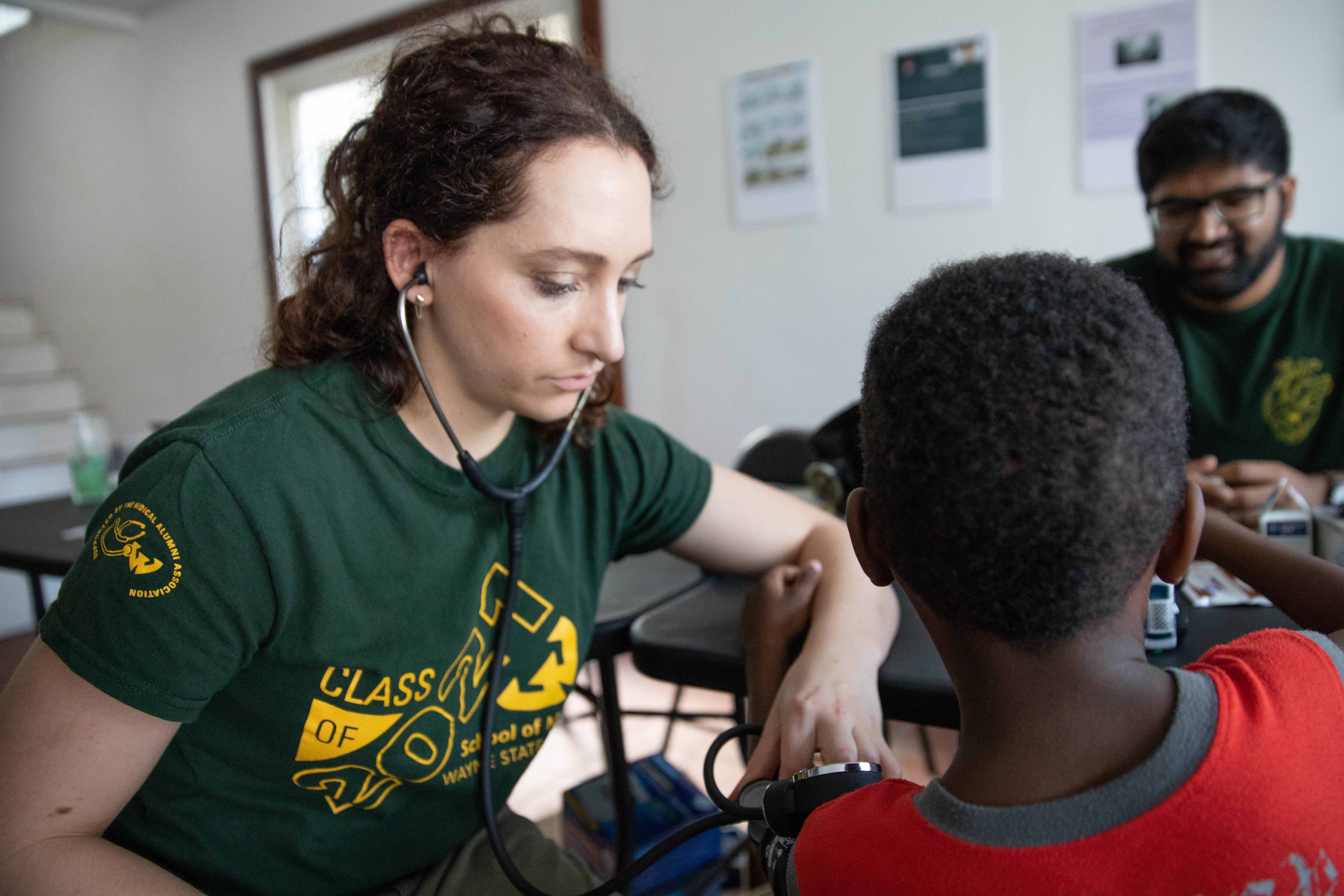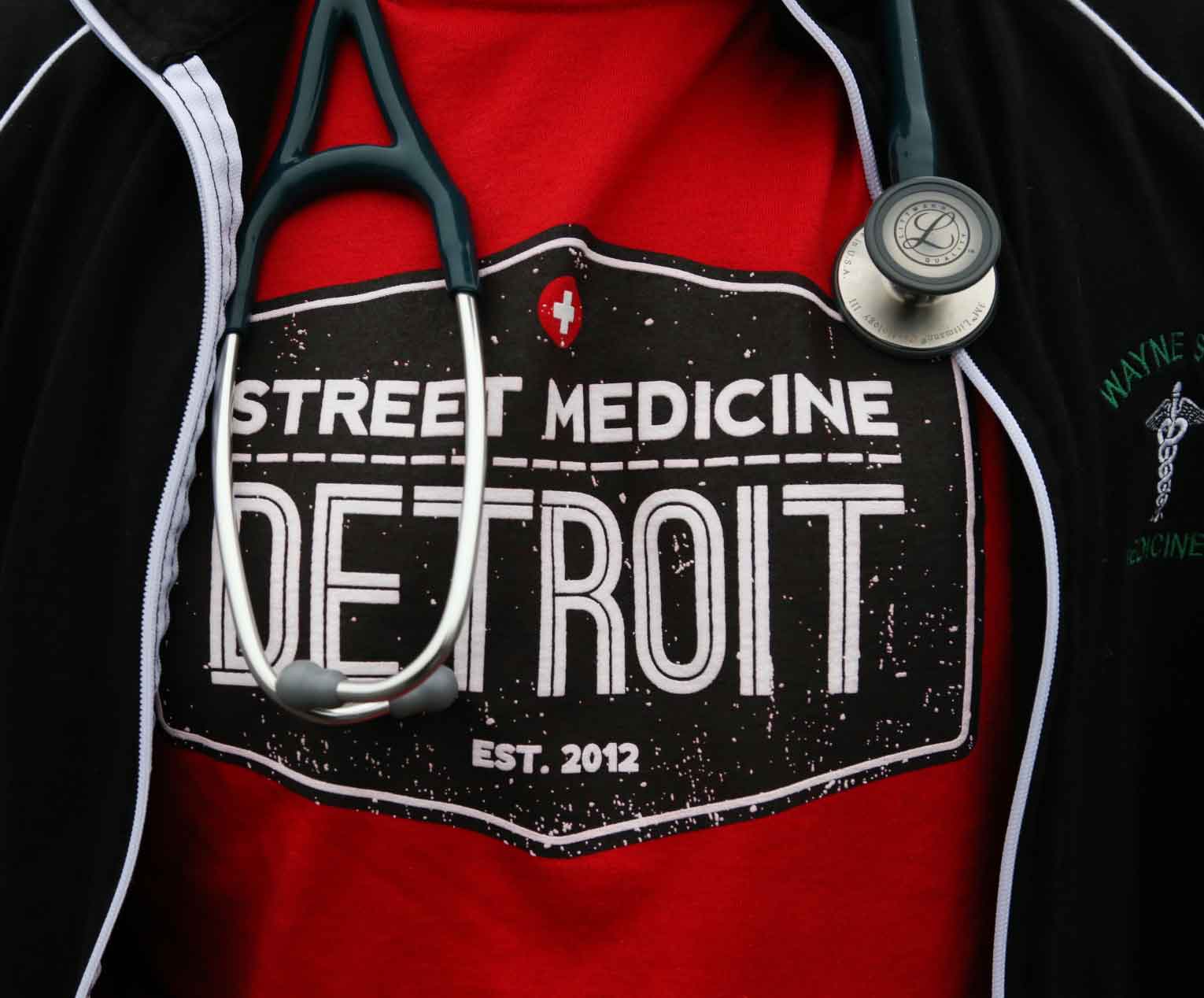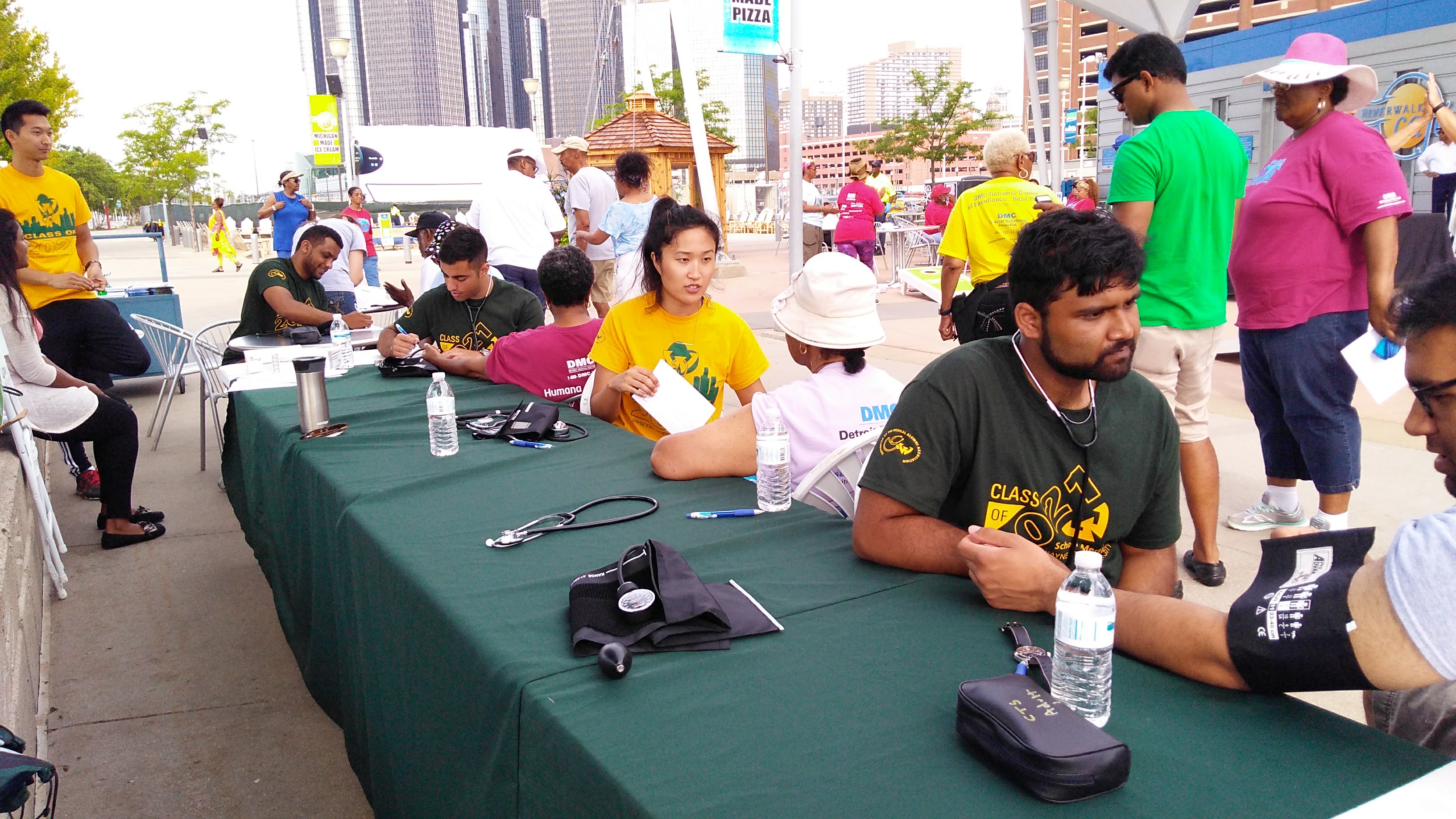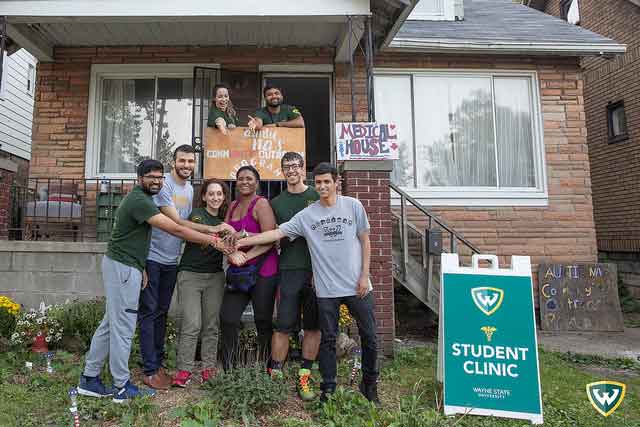
Caring for the underserved and underinsured people of southeast Michigan and around the world has become the calling card of the medical student attracted to the Wayne State University School of Medicine.
“We believe in service. We believe in meeting— and surpassing—the health care needs of diverse communities,” said School of Medicine Dean Jack D. Sobel, M.D. “It’s at the heart of what we do and why we do it, in research, education and clinical care.”
Equal health care and access for the city’s people, in particular the homeless, the elderly, and children and families who are less fortunate, is a regular battle cry for the physicians and faculty of the school. That joy for care, service and selflessness is reflected in the caliber of students who choose to come to Wayne State, he added.
Those students have been volunteering in medical clinics throughout the city and metropolitan region for as long as many faculty and alumni can remember. Community service has been embedded in our school’s DNA since our foundation in 1868, through our curriculum design, community engagements and outreach initiatives at 70 clinical and 100 outreach locations throughout southeast Michigan. In 2018, those traditions continue, but the efforts are more focused, organized and impressive than ever, leading to an unparalleled level of clinical competency.
“Wayne State University School of Medicine students excel clinically. They have seen and responded to challenges and situations most medically students around the nation only read about. Our students are known for their clinical competence and have a reputation for excellence you don’t see elsewhere,” Dr. Sobel said.
Robert R. Frank Student-Run Free Clinic
Wayne State continues to lead the way among its peers, just as it did 10 years ago, when the first student-run free clinic opened in Michigan. The Robert R. Frank Student-Run Free Clinic in Detroit is just example of learning urban clinical excellence and delivering the promise of equal health care for all. The clinic was first proposed by a member of the Class of 2008, and eventually founded in 2009 by the School of Medicine’s Class of 2012.
That year, the student governing body officially recognized the Robert R. Frank Student-Run Free Clinic, named in honor of a School of Medicine dean known for his commitment to the underserved. These efforts culminated in the grand opening of the clinic in the summer of 2010.
The clinic – open from 9 a.m. to noon Saturdays inside Mercy Primary Care – has provided free primary and preventive care, medications, laboratory services, mental health counseling, nutrition counseling, alcohol and smoking cessation, and social work to uninsured patients in Detroit ever since. The clinic is solely supported by sponsorships, donations and fundraisers, with 100 percent of funds raised going to patient care and operational costs. Mercy Primary Care donates its facilities. In recent years, more than 200 students and nearly 20 WSU Family Medicine physicians volunteered more than 200 hours on average, serving about 40 patients for a total of about 130 visits annually. In one year, the clinic helped transition 19 patients to insurance programs after learning they met the requirements for state and federal plans.
The Frank Clinic is one of many free clinics that Wayne State students either run or volunteer at, always directly supervised by senior faculty physicians, residents or other health care professionals, including nurse practitioners.
Street Medicine Detroit 
That’s the case with Street Medicine Detroit, which was founded by the Class of 2015’s Jonathon Wong, M.D., with guidance from the founder of the Street Medicine movement, Pittsburgh’s Jim Withers, M.D., and local supervision from Dean Carpenter, a certified nurse practitioner affiliated with the University of Detroit Mercy.
In partnership with the Neighborhood Service Organization and Southwest Solutions, Street Medicine Detroit delivers health care and related services directly to the city’s homeless, who are often service-resistant and staying in temporary shelters or living on the streets. The medical students visit the homeless twice a week with social service providers, are supervised by Carpenter, and perform basic health procedures such as checking vitals, testing blood glucose levels, answering medical questions and distributing medications as needed.
The group’s goal is to improve health outcomes in the underserved population and reduce emergency department visits and costs. The number of patients treated by the students as of 2017 was 776, while the number of encounters is 1,128.
“We are seeing repeat patients, which is great for continuity of care and rapport,” said Class of 2017 graduate Esther Chae, M.D., who joined the student organization in 2013.
The organization received WSU’s inaugural Spirit of Community award in 2017 in the Project Engagement category and the Dr. Arthur L. Johnson Community Leadership Award from the WSU Office of Government and Community Affairs in 2015.

The Cass Student Health Clinic Program
The Cass Student Health Clinic Program, or Cass Clinic, is another School of Medicine clinical tradition, providing free physical exams, disease prevention and screenings, patient education and medication refills to those who need it most, from individuals to families.
The clinic operates in Detroit every Saturday from 9 to 11:30 a.m. at 3745 Cass Ave., and at the Cass Expansion Clinic every Wednesday from 4:30 to 6:30 p.m., at 11850 Woodrow Wilson St. Both are staffed by medical student volunteers and an attending physician. The clinic is an opportunity for WSU medical students to gain first-hand experience with patient care, and is sponsored by The Aesculapians, a service-oriented student organization of the School of Medicine. The Cass Clinic is organized and operated by seven medical student coordinators each year.
The same clinic also hosts Sight Savers, a student-run ophthalmology group that provides free eye exams, and Food Medicine, a student-run nutrition group.
Like the Robert R. Frank Student-Run Free Clinic, Cass Clinic operates almost exclusively through donations.
Project H
Another longtime student-led clinic is Project H, a bimonthly clinic established by first- and second-year homeless students in 2000 at the Wayne County Family Center in Westland, Mich. The center is the only homeless shelter in Michigan that allows families to stay together, with Project H catering specifically to shelter residents. Students practice taking histories and perform physical exams, and present their patients – adults and children – to Wayne State University physicians.
“Students can easily get lost in the hustle and bustle of medical school and lose sight of why they entered medical school in the first place, and this is where Project H is a great opportunity to remind us all that we came to Detroit to serve the community and take care of those in need,” said Edward Rooney, M.D., an alumnus who served as a clinic coordinator as a student. “Project H offers the ability to directly connect to Detroit and the community, and truly make a difference in someone’s life, even in your early years as a medical student.”
The aforementioned initiatives are only a sample of the clinical volunteer experiences students can participate in and learn from while pursuing their medical education at the School of Medicine. In all, medical students can volunteer in and earn Co-Curricular Program credits at 75 clinical locations in Detroit and the surrounding area.
Auntie Na’s Student Organization
Yellowstone Street, at Elmhurst Avenue on Detroit's west side, is the site of Auntie Na's House, a nonprofit 501(c)3 organization that includes a new student-run health clinic aimed at women's health and wellness. The rehabilitation of the two-story home was made possible by a $150,000 grant from the Kresge Foundation, and supported by the leadership and expertise of Associate Professor of Medicine and Director of Subinternship and Ambulatory Programs Joel Appel, D.O., who serves as the clinic preceptor, and School of Medicine Director of Community Engagement and Associate Professor of Internal Medicine Jennifer Mendez, Ph.D.

The Medical House, as it is known, is already the site of tutoring on the second floor, and art projects by children who participate in Auntie Na's regular community enrichment programming, including summer camps, monthly street bazaar fundraisers and more. A medicinal garden of Echinacea and other herbs and flowers was planted by School of Medicine students on the home's front lawn last year.
The Medical House is part of "Auntie Na's Village" -- houses being remodeled or rebuilt this year on the same street as Auntie Na's, a colorful two-story home that has been in one family for six generations. The village includes a clothing house that doubles as an emergency shelter, a tutoring house that is in need of interior repairs, and other buildings aiming to care for the community at large, especially children. One of the additional buildings the group seeks to develop is a nutrition house that serves as a community center for residents to obtain access to healthy food, receive nutrition education, gain skills in cooking and planning meals on a budget, and obtain referrals for health care when needed.
Some homes in the "Village" are built from the ground up in vacant lots adjacent to the original home; others will be located in now-abandoned homes across the street.
The Auntie Na's Student Organization at the School of Medicine is new, officially forming in 2018 after second-year students who volunteered at Auntie Na's House in the 2017-2018 academic year for their Year 1 required service-learning project wanted to keep going, and do more. The organization has an executive board and about a dozen active members, over three branches of outreach -- youth enrichment, gardening and nutrition, and clinical care, with two student coordinators at each branch. They're already working with fellow medical school student organizations on programming at the house.
When weather permits, students involved in Auntie Na’s Student Organization, using a $2,000 grant from Gleaners Community Food Bank and Campbell Soup Co., will host "Health Smarts" events every Tuesday and Thursday from 5 to 6 p.m. on the sidewalk in front of E&N Market on Livernois Avenue in Detroit. The students perform health screenings, including blood pressure, then discuss the individual's diet and present them with a healthy eating plan. From there, another student shops with them inside the corner store, recommending better food options, reviewing sodium and sugar content on nutritional labels, and providing $6 to use for fresh vegetables, fruit, water, milk or eggs. Dr. Mendez brought the program idea to the students. At the request of the School of Medicine, the store stocks more produce than it had, and installed an additional refrigerator to hold healthy items for customers to purchase.
"They've started stocking healthier food options here," said second-year medical student Zaid Mohsen.